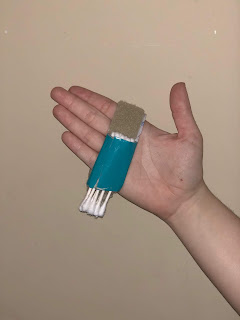Media Project Using Q-Tips
For my media project, I was instructed to turn a household item into a meaningful intervention for an individual with a specific diagnosis made up by my professor. The item I was randomly assigned to was a Q-tip. The diagnosis I was paired with involved a man named Craig with a C5 complete spinal cord injury. I took his demographics, employment, and family life into consideration as I constructed a task that would be occupation-centered to relate to his job as the owner of a CD, DVD, and tape shop. Also, I had to take into consideration that Craig would be starting OT with a halo vest. This would limit movement of his head and neck. Before beginning my project, I was very nervous about how I was supposed to make such a small item useable by a person with no hand or finger strength. I am thankful that I learned how to make a universal cuff with velcro and duct tape earlier in this course. The cuff is an important component of my project, since Craig can not flex his fingers to grasp the Q-tips. With the cuff, Craig can move the Q-tips in a side to side motion by using his shoulder strength. I believe the most important takeaway from this project for me is the importance of meaningful and occupation-centered tasks. This is something that I have been told countless times by all of my professors. I knew this was true, but I think this project really helped me realize this. As occupational therapists, seeking out activities and tasks that are purposeful is imperative towards fueling the individual's attention and motivation. I believe if Craig was a real person that suffered from a complete C5 spinal cord injury, he would be appreciative of this small yet personalized task that can relate back to his work as the owner of a disk shop. Having a person engage in a task that pertains to an occupation that they were once successful in will help them see that even though adaptations might need to be made, one should never say never. Looking forward to my clinical experiences and even future projects, I will now always consider the use of everyday household items as I think of possible interventions. Also, I will continue to value my obtained knowledge of building an occupational profile, as it is a key component towards constructing a meaningful intervention. Even though I am not an engineer, this project has given me the confidence to think outside the box. I will look at household items, especially Q-tips without boundaries for their use. Now, I will always remember how it's not about the complexity of a task, but the meaning behind it that holds true value.



Comments
Post a Comment